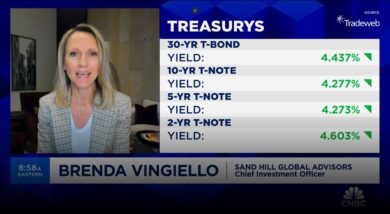Sand Hill's Chief Investment Officer, Brenda Vingiello, CFA, joins Jenny Harrington on “Halftime Report” to go over their most recent portfolio moves. Brenda's commentary begins

No Good Deed Goes Unpunished – Insuring Your Nonprofit Work
There are many great reasons to serve as a director or officer (D&O) of a nonprofit organization. Perhaps you have a desire to make a difference, you aspire to strengthen your community, you wish to develop and grow as a leader, or you are called upon because you possess specialized skills and expertise that could benefit the organization. But did you know that you could be putting your personal assets at risk if you do not have the proper insurance to protect yourself? Almost any day-to-day decisions or actions by those associated with a nonprofit organization can trigger a lawsuit. These claims can be costly and disruptive to an organization as well as for board members who can be held personally liable. Ensuring that a nonprofit organization has the appropriate coverage is critical to protect the individuals and assets that support the organization to fulfill its vision.
Many assume that nonprofits are immune from the risk of a lawsuit based on the notion of charitable immunity. In fact, a nonprofit organization is particularly vulnerable and lawsuits against D&O are increasing at an alarming rate. Unlike for-profit corporations, reporting requirements and oversight by regulatory agencies for these organizations are less robust, leaving the door open for potentially inadvertent misconduct. For most, service is part-time and decision-making can be hindered by incomplete information and the inability to carefully review important documents. If your actions as a board member fall below a standard of care, you could be sued and held liable for damages. And while about 95% of claims filed against D&O policies are related to wrongful termination, harassment or discrimination, you should be aware of the other types of suits that you and your organization could face, such as mismanagement of assets or donations, failure to fulfill the organization’s mission, improper conduct by volunteers and claims from government agencies due to violation of laws or statutes – just to name a few! Even if the claims are ultimately proven false, the defense costs can sometimes be devastating.
In California, the average employment practices claim against a nonprofit organization is about 45% higher than the rest of the country.1 Also, you will find in California that employment laws are more complex and more favorable toward employees, so attorney fees tend to be higher.
So how should you proceed? First, identify the issues that put your particular organization at risk. Consider all of the resources (staff, property, financial capital) as well as the types of activities in which the organization engages. Now, think about what can go wrong and review the insurance policy currently in place.
Even if the claims are ultimately proven false, the defense costs can sometimes be devastating…
Does the coverage accurately reflect these potential challenges? What losses are specifically excluded from coverage? Do volunteers pose a special risk issue? Who is included in the coverage? Are all costs paid by the insurer as they are incurred?
It is important to note that there is no standard D&O policy, so each one must be evaluated on its own merits. And, many nonprofits operate on a shoe-string budget which result in carrying only the minimum amount required by law. Once you have determined coverage provided by the nonprofit organization, you should contact an insurance broker to determine if you need additional coverage. Costs and deductibles vary widely depending on insurer, breadth of coverage provided, prior claims and quality of employment practices.
Your organization should also purchase general liability insurance to cover bodily injury or property damage, as these events are not included in D&O insurance.
So if you are currently sitting on or are considering joining a nonprofit board, understand your fiduciary responsibilities and confirm that your risk exposure is minimized through a tailored D&O insurance policy. With an average cost of $35,000 to defend a claim and the likelihood that one in every ten claims will exceed $100,000 before reaching resolution, you should not wait until something adverse occurs.
Articles and Commentary
Information provided in written articles are for informational purposes only and should not be considered investment advice. There is a risk of loss from investments in securities, including the risk of loss of principal. The information contained herein reflects Sand Hill Global Advisors' (“SHGA”) views as of the date of publication. Such views are subject to change at any time without notice due to changes in market or economic conditions and may not necessarily come to pass. SHGA does not provide tax or legal advice. To the extent that any material herein concerns tax or legal matters, such information is not intended to be solely relied upon nor used for the purpose of making tax and/or legal decisions without first seeking independent advice from a tax and/or legal professional. SHGA has obtained the information provided herein from various third party sources believed to be reliable but such information is not guaranteed. Certain links in this site connect to other websites maintained by third parties over whom SHGA has no control. SHGA makes no representations as to the accuracy or any other aspect of information contained in other Web Sites. Any forward looking statements or forecasts are based on assumptions and actual results are expected to vary from any such statements or forecasts. No reliance should be placed on any such statements or forecasts when making any investment decision. SHGA is not responsible for the consequences of any decisions or actions taken as a result of information provided in this presentation and does not warrant or guarantee the accuracy or completeness of this information. No part of this material may be (i) copied, photocopied, or duplicated in any form, by any means, or (ii) redistributed without the prior written consent of SHGA.
Video Presentations
All video presentations discuss certain investment products and/or securities and are being provided for informational purposes only, and should not be considered, and is not, investment, financial planning, tax or legal advice; nor is it a recommendation to buy or sell any securities. Investing in securities involves varying degrees of risk, and there can be no assurance that any specific investment will be profitable or suitable for a particular client’s financial situation or risk tolerance. Past performance is not a guarantee of future returns. Individual performance results will vary. The opinions expressed in the video reflect Sand Hill Global Advisor’s (“SHGA”) or Brenda Vingiello’s (as applicable) views as of the date of the video. Such views are subject to change at any point without notice. Any comments, opinions, or recommendations made by any host or other guest not affiliated with SHGA in this video do not necessarily reflect the views of SHGA, and non-SHGA persons appearing in this video do not fall under the supervisory purview of SHGA. You should not treat any opinion expressed by SHGA or Ms. Vingiello as a specific inducement to make a particular investment or follow a particular strategy, but only as an expression of general opinion. Nothing presented herein is or is intended to constitute investment advice, and no investment decision should be made based solely on any information provided on this video. There is a risk of loss from an investment in securities, including the risk of loss of principal. Neither SHGA nor Ms. Vingiello guarantees any specific outcome or profit. Any forward-looking statements or forecasts contained in the video are based on assumptions and actual results may vary from any such statements or forecasts. SHGA or one of its employees may have a position in the securities discussed and may purchase or sell such securities from time to time. Some of the information in this video has been obtained from third party sources. While SHGA believes such third-party information is reliable, SHGA does not guarantee its accuracy, timeliness or completeness. SHGA encourages you to consult with a professional financial advisor prior to making any investment decision.







